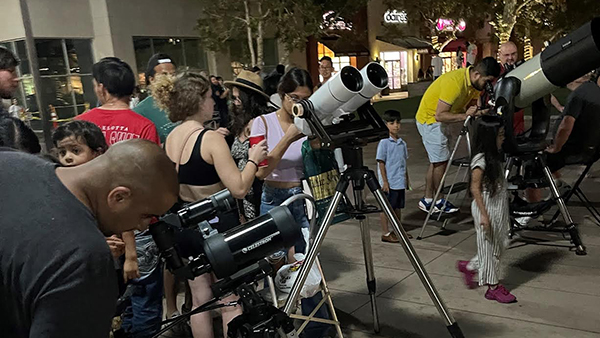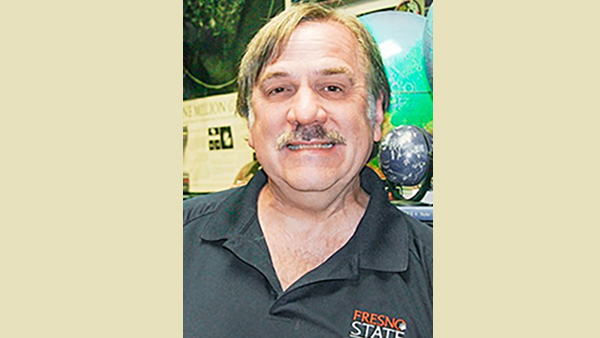|
We hope you enjoy this series where we meet and get to know employees from across campus. Would you like to be featured? Contact us at campusnews@csufresno.edu.
Name: Frederick A. Ringwald
Title: Professor
Department: Department of Physics
Academic Degree(s):
- B.A. Physics, Northwestern University
- B.A. Astronomy, Northwestern University
- Ph.D. Physics with astronomy dissertation, Dartmouth College
How long have you worked at Fresno State and in which offices have you worked?
It’s been 23 years, since fall 2000. All this time, I have been some kind of tenure track professor in the Department of Physics.
Are you a Valley native?
I was actually born in a nice suburb of New York, on Long Island. Since I was 12, I have lived in Switzerland, rural Central Florida where I graduated from high school, Chicagoland, the Chesapeake Bay area in Virginia, Mare Island in San Francisco Bay, Charleston in South Carolina, New Hampshire, the Boston area, England, Tucson in Arizona, Central Pennsylvania, and the Space Coast of Florida. I have lived in Fresno longer than I’ve lived anywhere else. One thing that brought me to Fresno is that the weather is essentially perfect for astronomy, from mid-March to mid-November. I routinely turn my nose up at weather I’d have jumped at the chance to use when I was an undergraduate near Chicago.
I think one of the great things about living in the Valley is that the sense of adventure still hasn’t worn off. This semester, for example, I have been taking students to Fresno State's station at Sierra Remote Observatories in the mountains, to do astrophotography. It’s much like how I felt living in England. Every day was a new adventure—although there were days when it felt like I was living in a Monty Python episode.
Are you part of a Bulldog family with generations of Bulldog graduates or current students?
No, but first-generation college students have my sympathy. So do the international students, especially when they’re still in that early phase of being a stranger in a strange land. I think our students are likable exactly because they’re not so wealthy or privileged. They are unlike too many Ivy League students I've seen being just horrid, often to people who were trying to help them. This is especially since I know I am extraordinarily privileged. Both of my parents valued education greatly, were well educated, and were very encouraging and supportive.
Still, neither of them had a background in science. For much of my journey, I was on my own. I got interested in science when I was five years old. I didn’t get science teachers who knew more science than I did until 11th grade. This caused all kinds of problems. I therefore want to encourage Don Williams. Don takes a van full of students and equipment to local K-12 schools, as part of his PHYS 168S Physics Outreach service learning course. I also want to encourage all the other good science teachers in the Fresno area. They have their work cut out for them.
Do you have a campus mentor or someone who has helped you in your career?
During my first few years, my faculty mentor was Gerardo Muñoz. Excellent staff members such as Roger Key, the instructional support technician for the Department of Physics, have also been very helpful. Doug Singleton does an exemplary job as department chair.
Tell us about your department and what people may not know about it.
The Department of Physics is a friendly environment, where students have ready access to faculty and research opportunities. Physics is active in many research areas. These include astrophysics, biomedical physics, computational physics, high-energy physics, nanotechnology, relativity theory, strongly correlated electron physics, and quantum field theory.
We also have superb opportunities for student involvement in teaching. The Downing Planetarium presents shows to over 15,000 visitors per year, mostly local K-12 school kids but also to the general public. Students from the education school often call Don’s PHYS 168S Physics Outreach course, “the best education course I ever had.” This is pretty good, considering we’re not the education school: we’re the Department of Physics.
What is your most notable accomplishment in your field, and why was it important?
My Ph.D. thesis was the first population study of what until then had been a highly idiosyncratic class of stars: the cataclysmic variables. They have all manner of eruptions, outbursts, and other poorly understood behavior. By picking out and observing an unbiased sample, I helped to discover two subclasses.
The first has “mysterious, but consistent, behavior,” which is still befuddling scientific minds worldwide. It still gets lots of interest, because it's likely to be a major clue to how stars and planets form. The second subclass does quite the opposite, by filling in a missing link. This helps astronomers understand the big picture of what these stars are, what they do, and how they change over time — or in other words, evolve.
My advice to young scientists on how to get ahead in science is to publish papers about large collections of objects, whether they are planets, stars, galaxies, or whatever. One of these objects will inevitably be some other scientist’s favorite. This way, other scientists will read and cite your papers. The law of supply and demand works in science, too. If no one reads your papers, it won’t be easy to get a job as a scientist.
What are you most passionate about in your field and why?
The meaning and purpose of life are many things to many people. For me, exploring the universe has always been lots of fun.
The zoo of interacting binary stars, in which one star is so close to another it greatly affects the other, is a wonderful place to spend a life. They do so many different things, involving so many different kinds of physics. Some of them are so cool I can barely stand it, such as the black holes that are eating companion stars. Some of the science is actually of immediate practical use to everyday people, such as how solar flares spew radiation that messes up cell phones, and can cause power failures.
What is a memorable moment you had at your job?
As the only astronomer working in the Fresno area, I get all the UFO calls. My advice to students on how to answer UFO calls is: be kind and respectful to people who make UFO calls, since nine out of 10 of them are perfectly sane and have seen something remarkable in the sky.
Here, we get lenticular clouds, which are lens-shaped clouds from the airflow over the mountains. We also get missile launches from Vandenberg Space Force Base. The remaining one in 10 people who make UFO calls are often poor souls who are not helped one little bit by being ridiculed, so don't. As Professor Hynek told me at Northwestern, "Ridicule is not part of the scientific method."
Never once have I been able definitively to identify an extraterrestrial spacecraft. Still, I don’t want to be caught napping when the first one comes in.
What is a memorable moment you had in class?
I teach a variety of courses for the Department of Physics. Probably the best question I ever got from a physics major was, “What happens when two galaxies collide?” I answered, “You get fireworks.”
I sometimes teach a general-ed course (PSCI 21, Elementary Astronomy), for students not majoring in science. During the class on cosmic history, it’s always fun to hand around meteorites and fossils, including dinosaur teeth and eggs.
Probably the best question I ever got from any student was from a student in that class. The question was, “Why is the universe so big?” The best answer I could come up with was, “If it weren’t, life would have a tough time, with all the supernovae (which are exploding stars) being more nearby.”
This student was a business major, who told me he had “no science background.” It’s vital to keep encouraging the students to keep asking those questions.
What is your teaching style?
I do my best to be Socratic. But then, as Plato wrote in his dialogue “The Apology,” when Socrates was accused of sorcery, his reply was that he never taught natural science or mathematics.
What is your favorite quote or saying?
"How many more years I shall be able to work on the problem I do not know; I hope, as long as I live. There can be no thought of finishing, for ‘aiming at the stars’ both literally and figuratively, is a problem to occupy generations, so that no matter how much progress one makes, there is always the thrill of just beginning." — Robert H. Goddard, in a letter to his hero, H.G. Wells, in 1932.
What is the most interesting or unusual job you've ever had?
Being a professional astronomer is even cooler than being a cowboy. (Sorry, cowboys.) I am especially grateful for having been in that generation of astronomers from 1980 to about 2010, who still traveled halfway around the world to get a look at a star, but operated the digital cameras on the telescopes from a nice, warm control room next door to the telescope room. We didn’t have to sit in the freezing cold dome, the way we did before 1980 when we still used old-fashioned chemical photography. Since about 2010, nearly all professional astronomy using telescopes has been entirely over the internet. I suppose this is less carbon intensive.
Runner-up would be running the shows in the Adler Planetarium in Chicago. Astronomers don't get to operate the real universe like that. Honorable mentions include fixing radars while serving on a U.S. Navy destroyer, and driving taxis in Chicago as an undergraduate. I don’t recommend that last: it was dangerous. It did beat running a nuclear reactor on a Navy submarine.
What do you like to do for fun in your spare time?
I have lots of fun with the amateur astronomers in the Central Valley Astronomers, who are Fresno’s astronomy club. Amateur astronomers still look through telescopes. This is unlike professional astronomers, who almost always use digital cameras or other instruments. It still is good to look at things with one's own eyes.
The Central Valley Astronomers host monthly Sidewalk Astronomy events, in River Park mall. It's an excellent way to do public outreach. The moon is as bright as an asphalt parking lot in broad daylight. Even from a brightly lit shopping mall, one can see the moon perfectly well.
Sidewalk astronomy is fun because almost none of the public have ever looked through a telescope. People literally gasp at good views of the moon, Saturn and Jupiter.

|
|
Sidewalk Astronomy events in River Park
|
What is something interesting about you that most people don’t know?
I will be retiring at the end of May of 2026. My girlfriend is a singer who used to work for Disney and now works for Universal Studios. She lives in Orlando, Florida, about half an hour away from where we met when we were in high school. She is expecting me to move to Orlando then.
Is there something else you would like to share that was not asked?
I grew up watching the original Star Trek. In 1966, it presented something American eyes hadn’t seen much of, previously: a noticeably multiethnic crew, working together efficiently and professionally, and getting along well in their off time. I am saddened that the world we live in now still isn’t like that — but of course, the future hasn’t happened yet.
As a working scientist, I should know better than to say, “That will never happen,” about anything. It’s all up to us.
|



